Surrogates
 for intense sequences of violence, disturbing images, language, sexuality and a drug-related scene.
for intense sequences of violence, disturbing images, language, sexuality and a drug-related scene.
Reviewed by: Michael Karounos
CONTRIBUTOR
| Moral Rating: | Average |
| Moviemaking Quality: |
|
| Primary Audience: | Adults Teens |
| Genre: | Sci-Fi Action Thriller |
| Length: | 1 hr. 28 min. |
| Year of Release: | 2009 |
| USA Release: |
September 25, 2009 (wide—2,700+ theaters) DVD: January 26, 2010 |
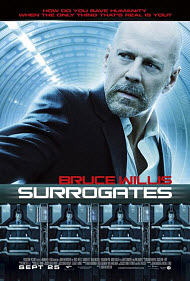

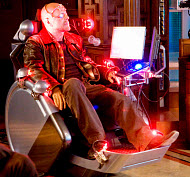

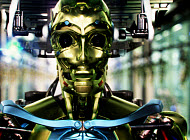

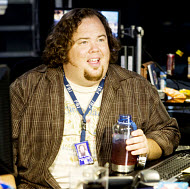

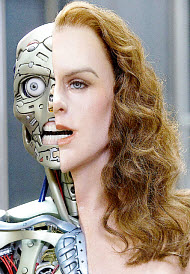
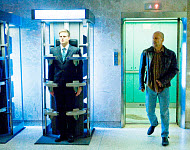


About murder in the Bible
Death in the Bible
Is Satan a real person that influences our world today? Is he affecting you? Answer
DEPRESSION—Are there biblical examples of depression and how to deal with it? Answer
What should a Christian do if overwhelmed with depression? Answer
Why does God allow innocent people to suffer? Answer
What about the issue of suffering? Doesn’t this prove that there is no God and that we are on our own? Answer
Does God feel our pain? Answer
ORIGIN OF BAD—How did bad things come about? Answer
Did God make the world the way it is now? What kind of world would you create? Answer
VIOLENCE—How does viewing violence in movies affect families? Answer
| Featuring |
|---|
| Bruce Willis (Agent Greer), Rosamund Pike (Maggie Greer), Radha Mitchell (Agent Peters), Ving Rhames (The Prophet), James Cromwell, See all » |
| Director |
|
Jonathan Mostow |
| Producer |
| Touchstone Pictures, Mandeville Films, See all » |
| Distributor |
“How do you save humanity when the only thing that’s real is you?”
This movie is based on a graphic novel (comic book) by Robert Venditti and Brett Weldele.
“Surrogates” is a surprisingly interesting film with numerous Christian elements. It is written by the same team that wrote “Terminator: Salvation,” Michael Ferris and John D. Brancato, and stars Bruce Willis as FBI agent Tom Greer who has little to do in a dystopic future because everyone lives crime-free lives through robotic alter egos. Technology has advanced to the point that people can sit in chairs at home and send out “surrogate” (substitute) selves in their place. The robots are indistinguishable from people, and 98% of the human race lives their daily lives through their surrogates. The surrogates have the same personalities as their human “operators,” but they are as indestructible as machines. They play, drink, dance, have sex, etc., without physical limits to their desires. Nothing that happens to the robots affects their human operators.
A perfect world has perfect appearances. Surrogates are uniformly handsome and beautiful. It is a society of models with not a single imperfect human in evidence. As psychological expressions of their operators, the surrogates live a purely materialistic existence and yet seem to have fulfilled lives. Indeed, society itself has become one vast hive of surrogacy, since no real humans ever go out of the house anymore. Wealth, health, and pleasure are all experienced indirectly. There are no crimes of greed or passion, and the voice-over narration even claims that racial discrimination is a thing of the past. In other words, sin appears to have been vanquished.
Meanwhile, the human race has divided into two groups. The first group is a small minority of disgruntled misfits who live on reservations. A man called the “Prophet” (Ving Rhames) is their leader, and their anti-robotic cult degenerates into a society that is impoverished, violent, and ignorant. The second group comprises the other 98% of humanity who live in an artificial Sims world that is flawless but spiritually hollow. These chair-bound humans can enjoy endless kinds of pleasure without the consequences of their transgressive behavior. The antitheses are stark: a life of pleasure vs. a life of pain; a society that is mechanically perfect but inhuman vs. a society that is chaotic but human. Scientific rationalism rules one reality; human emotion rules the other.
Into this materialistic paradise enters sin. Someone has discovered how to kill people by killing their surrogates and plots to kill the entire human race. The same person who introduced people to sin wishes to kill them for their sins. This person is analogous to Satan, both in his animus toward people and in his representation as a false prophet.
Greer tracks the murderer into the movie’s “hell”—the human reservation—but he pays a price. The brutal humans, in the most important image of the movie, crucify the surrogate. This crucial Christian reference is made more significant by the fact that the Prophet’s followers were the ones who crucified him.
The person behind the murder of the surrogates later says, “In order to kill the addiction you have to kill the addicts.” In this context, one can understand “addiction” as sin and that the philosophy of the person who wants to effectively destroy the entire human race is that sin and the sinner are synonymous. This, of course, is the opposite of Christ’s teaching.
Bruce Willis, who now has no surrogate, symbolically enters the world of virtual people as a flesh and blood man. He is beaten, bruised, and hounded in his attempt to solve the crimes. Furthermore, he is dealing with the depression of his wife who is grieving the loss of their child. Unable to cope with the real world, she has dissolved her personality into that of her surrogate and has become addicted to sedatives. Her dependency reaffirms the theme that “surrogacy” is a drug that the human race is addicted to.
DEPRESSION—Are there biblical examples of depression and how to deal with it? Answer
What should a Christian do if overwhelmed with depression? Answer
The movie seems to be saying that, in this day of computer networking (e.g. Facebook and Twitter), people are interfacing through virtual identities and not in person. In virtual reality, everyone is perfect; no one is old or fat or ugly or handicapped. The beauty of variation is sacrificed for the beauty of uniformity. This dependency has made people afraid of imperfection and real social interaction. All judgments are made on the superficial basis of appearance.
Without giving away the plot twists, Greer coaxes his unbeautiful wife out of her virtual cocoon, and the movie ends on a marvelously redemptive note. Greer sacrificed his own “sin” (surrogate) to order to put to death the sins (surrogates) of others. The powerful scene of all the surrogates falling down is succeeded by the spectacle of people coming out of their homes for the first time in years. Respectively, these actions represent death and resurrection. Just as Christ’s surrogacy paid the price for all, so does Greer’s. Greer’s substitutional death on the cross atones for all of humanity. The message is that sacrificial love redeems the film’s “multitude of sins”: vanity, greed, debauchery, sloth, and even excessive grieving, as in the case of his wife. Remarkably, the movie manages to incorporate all these disparate themes--sin, crucifixion, atonement, Satan, false prophets, death, resurrection—without beating the viewer over the head with the obvious Christian message underlying those elements. One has to pay careful attention to catch the symbolism of events and archetypal characters.
“Surrogates” is not a perfect film, but in terms of its themes, it is a perfect parable of Christ’s sacrifice. Jesus died on the cross for us so that we may throw off the surrogacy of the flesh and be resurrected as He made us, free of our man-made and sinful selves. The film models the Christian narrative without exploiting or trivializing it. This one is worth seeing for the artful elaboration of the Gospel.
Violence: Heavy / Profanity: Mild / Sex/Nudity: Mild
See list of Relevant Issues—questions-and-answers.


The only thing I can say bad about this film is that the director could have made a little more use of the storyline—I felt at the end like something was missing…
Moral rating: Good / Moviemaking quality: 3½
While I enjoyed to opportunity to think through the message with my wife, I won’t be using this with my tweener or younger children. It is much too violent and disturbing to justify the weak message that it carries. I would recommend it to most of my Christian friends as a way to look at their own lives and generate some honest and revealing questions about ones own passivity and apathy.
Don’t go if you have a hard time disconnecting yourself from the very realistic looking robots that get frequently annihilated. Viewing these robots as truly human would be extremely disturbing as they get bashed and battered throughout the film. Sexually speaking, there are some odd and questionable moments where again robots (totally realistic human looking characters) are subject to some degrading and repugnant displays of skin, behavior and interaction that will offend some.
Probably a good movie to rent rather than spend a bunch at the theater. Hit the fast forward a couple of times and the rest is worth postulating over.
Moral rating: Average / Moviemaking quality: 3½
Like “I, Robot” or the recent hit-'n-miss “Gamer,” this movie recognizes the growing concern of man vs. technology. Who serves whom and where do you draw the lines on morality? What do we earnestly lose when our world is dominated by machines, both on a global and personal level? Etc. Makes me hope all the more Christ returns before mankind really loses itself, but then again, maybe we need to for more folks to come to know Him. Best I can extrapolate, “Surrogates” is merely an exaggeration of an existing problem, one that’s been around since the fall of man. God says “Thou shalt have no other gods before me. Thou shalt not make unto thee any graven image, or any likeness of any thing that is in heaven above, or that is in the earth beneath, or that is in the water under the earth. Thou shalt not bow down thyself to them, nor serve them: for I the LORD thy God am a jealous God…”
When we consciously, willingly put TV, video games, movies, human relationships, your dog, your lint collection, whatever between you and our Father, you say “this is more important than You Lord.” You distance yourself, and given enough time with no direction or moral compass, you embark on a godless life. “Surrogates” is a lesson in billions of people living these kinds of self-serving existences where the ultimate goal is to glorify oneself in the public eye.
Moral rating: Average / Moviemaking quality: 4
No doubt, the movie is thought-provoking as it asks the question—isn’t it better to be human and walk your journey, instead of living vicariously through someone else or something else. Not fortunately, the positives are mixed with negatives, which bring down the quality of this otherwise remarkable film. There is plenty of brutal, graphic violence. Even though it is mostly against dolls, their bodily injuries are way too realistic. Sex appeal occupies a lot of emotional space too. Tall, blond Scandinavian woman plays the supporting role; for a police officer, her clothing seems to be latest fashion. She does act spectacularly, jumping over buses, dressed in spandex from the waist down. At the end, she is destroyed, shot in her $500-worth haircut. Her human owner, a tired, peacefully sleeping lady is murdered by a repulsive surrogate. Sad.
I wouldn’t buy the DVD as I wouldn’t watch this movie a second time.
Moral rating: Offensive / Moviemaking quality: 5
Moral rating: Average / Moviemaking quality: 3½
Moral rating: Offensive / Moviemaking quality: 5
Very well, so not everyone will have their lunch at exactly the same time. But at least as a human, you can be reached (even during that sacred lunch period) by a loved one or an urgent business call. But if you are disconnected from your surrogate…See what I mean? The plot holes are bigger than the Channel Tunnel…! Even if people’s surrogates 'went to lunch', what would they eat? And what for?! And doesn’t the idea of not actually looking like their human counterparts mean that the humans are committing fraud (as per one of the victims being a big bald guy, and I think his surrogate being a blond girl)? I’m sorry, but I find the premise simply stupid.
As far as the religious aspect, well, I saw nothing in it that was as deeply portrayed or implied as the review seems to be. And the whole paragraph starting with “Into this materialistic paradise enters sin” seems way too deep for such a shallow film, which ultimately makes the whole description confusing. “Surrogates,” in my opinion, is flawed on many levels. The acting is thinner than the latest OLED television sets.
The plot has more holes in it than Swiss cheese. While the so-called religious aspect of it is confused and completely peripheral and non-productive.
Moral rating: Average / Moviemaking quality: 1½



My Ratings: Moral rating: Average / Moviemaking quality: 4